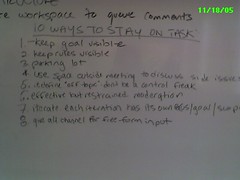- Home
- Blogs
- Alexandra Samuel's blog
- 10 ways to keep online dialogue on topic
10 ways to keep online dialogue on topic
- 18 November, 2005
- 0 comments
I’ve spent the past two days at a Ohio State for a conference on Building Democracy Through Online Citizen Deliberation, which has been a terrifically productive gathering. One session consisted of an interesting conversation about how to structure online deliberation in a way that promotes civil dialogue. We agreed that one key challenge was simply keeping online conversation on topic, and got most of the way towards a list of 10 ways to keep online dialogue on topic.

I thought others might find this list useful, so I’ve written it up and finished it off.
- Keep your goal visible. Write a clear statement of the goal of your discussion, and place it on your discussion board or chat window so that it will remain visible to all participants for the duration of your dialogue.
- Keep your rules visible. Write a succinct list of rules (”no flaming”, “maximum 2 mins per comment”, etc.) and keep them visible on your discussion board or chat window.
- Use moderation effectively — and sparingly. An effective moderator can help keep conversation on track by limiting off-topic conversation, but will be most effective if she is sparing in her interventions.
- Open a parking lot. Face-to-face facilitators sometimes create a “parking lot” — a space to write down comments or ideas that are off-topic, but still need to be acknowledged or documented. A virtual parking lot (perhaps a separate web page or discussion thread) can play an analogous role in housing comments that don’t quite fit the main disscussion.
- Create an alternative channel for free-form input. If your discussion is the only opportunity for participants to have their say, they will be highly motivated to bring a wide range of ideas, interests and views to the table — even if some of these comments are outside the scope of your discussion. By providing an alternative channel (like a suggestion box or feedback form) for input, you give participants a way of voicing comments that don’t fit into your dialogue process, and increase the odds that your discussion will stay on track.
- Offer outside spaces for outside discussion. Your participants are likely to want an opportunity to discuss the issues that they are dropping into your suggestion box or parking lot. Creating an “off topic” forum or e-mail list — a place to discuss all the odds and ends that don’t fit into your main discussion — can help keep your dialogue focussed.
- Try and try again. An iterative approach to dialogue — that is, multiple phases of conversation, each with a clear goal, start, and and end point — is more likely to maintain focus. Each phase of the dialogue can have its own distinct focus, and you can either narrow or broaden the scope of each phase in response to what you learned in the previous phase. So while the discussion will narrow or widen over time, each phase of the conversation will have clear goals and a clear and sustainable focus.
- Be a role model. If you’re moderating a discussion, you have to be more restrained about injecting off-topic comments or anecdotes than any of the other participants. That doesn’t mean suppressing your personality — the occasional joke can be a great ice-breaker — but pick your digressions wisely, and keep them short. The more focused you can be, the more focused your discussion will be.
- Reframe off-topic comments. Rather than pointing your finger and dismissing a comment as off-topic, try to reframe it so that it leads the group back into your main discussion. Even if you have to get creative: “Well it’s interesting you mention Madonna’s new single, because of course THE Madonna is a huge figure in the Catholic church, and the Catholic church has been a big influence on anti-poverty policy. Does anyone else have thoughts about how community groups can help address poverty?”
- Redefine “on topic”. The most innovative solutions to a policy problem or dialogue dilemma often fall outside the pre-defined alternatives on the table, or the pre-defined scope of the conversation itself. When keeping conversation “on topic” it’s helpful to take the broadest possible perspective on what your topic really is, so you don’t lose any of these “outside the box” gems. And don’t discount the value of the occasional joke or personal anecdote, either — by building social relationships and trust among participants, these off-topic conversations can make your on-topic conversation that much more effective.

